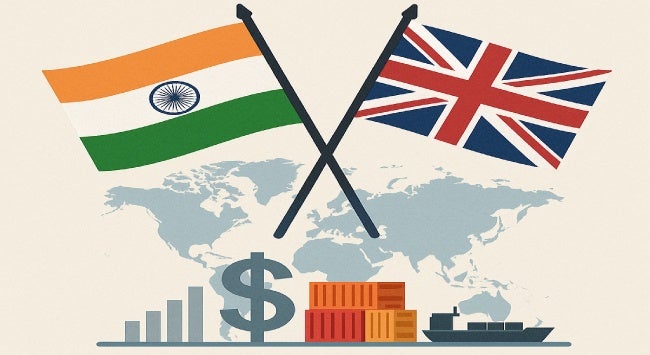India-United Kingdom FTA:
Signalling Decisive Shifts and Changes
Amitendu Palit, Mriganika Singh Tanwar
9 May 2025Summary
India and the United Kingdom have concluded a bilateral free trade agreement, demonstrating the eagerness of two of the world’s largest economies and middle powers to trade wholesomely with each other. It also marks a significant opening of India’s domestic services market.
India and the United Kingdom (UK) have concluded a bilateral free trade agreement (FTA) that they were negotiating for more than three years. The negotiations were fast-tracked from February 2025 and were formally concluded on 6 May 2025.
The UK government has stated that “The UK has secured the best deal that any country has ever agreed with India”. The euphoria is based on large tariff cuts for UK exports, as well as more access for UK service providers in India’s domestic market. The UK expects the deal to increase its gross domestic product by £4.8 billion (S$8.7 billion) each year, along with an annual increase in wages by £2.2 billion (S$3.9 billion). These increases are expected from an annual rise of £25.5 billion (S$46.2 billion) in bilateral trade. Bilateral trade in goods and services in 2024 was estimated at £42.6 billion (S$77.1 billion).
India has described the FTA “a historic and ambitious deal to boost jobs, export and national growth”. India’s expectations from the FTA are similar to those of the UK. Large tariff cuts are expected to significantly improve market access for several major Indian exports. At the same time, strong market access gains are also anticipated for many key Indian service exports to the UK.
Both countries have emphasised the Double Contribution Convention. This clause will exempt temporary Indian workers and their employers in the UK from paying social security contributions for a period of three years. The ostensible impact of this policy will be to make Indian workers cheaper for UK employers compared with those from other countries. This puts India on par with countries that have bilateral social security arrangements with the UK, exempting short-term workers from such payments. While temporary Indian workers will still have to pay health surcharges, the exemption from social security costs – such as national insurance, which is around £500 (S$870) per year – represents significant cost savings for employing businesses.
While the legal text of the deal is awaited, several key implications are important to note. The speed with which the deal was concluded underlines the urgency that both the Narendra Modi and Keir Starmer governments attached to its completion. It is perhaps not a coincidence that both sides finalised the deal soon after United States (US) President Donald Trump assumed office for a second term in January 2025. It is also noteworthy that both India and the UK are negotiating bilateral trade agreements with the US. These negotiations are occurring against the backdrop of the US having announced reciprocal tariffs on both countries.
While the outcomes of the negotiations with the US will be known over the next few months, India and the UK appear to share a common objective: to ensure that their goods and services gain preferential access to each other’s markets independently of developments in their respective trade relations with the US. Though the US remains a crucial trade partner for both, the disruptive character of the US’ trade policy is clearly encouraging global middle powers, such as the UK and India, to institutionalise their trade ties through distinct bilateral frameworks, thereby reducing dependence on the US.
Looking specifically at India, the deal signals important changes in its trade policy. The bilateral agreement has been described as “…the most comprehensive free trade deal ever entered into by India and will be the gold standard” for India’s future FTA engagements. The changes go beyond deep tariff cuts on UK food and beverage exports, as well as automobiles, including electric vehicles. More significant are the commitments expected from India in areas of its traditionally protected domestic market.
A key aspect is allowing UK businesses to participate in procurement contracts of India’s federal government agencies – a turf zealously protected by India historically. Another important commitment is the agreement to let professional services agencies from both countries determine mutual recognition of professional qualifications to increase market access. If implemented, this could mean India liberalising segments of its professional services sector, such as legal and accounting services.
All eyes will now be on the legal text of the document and its implementation to assess whether the FTA, indeed, lives up to the shifts and changes it signals.
. . . . .
Dr Amitendu Palit is a Senior Research Fellow and Research Lead (Trade and Economics) at the Institute of South Asian Studies (ISAS), an autonomous research institute at the National University of Singapore (NUS). He can be contacted at isasap@nus.edu.sg. Ms Mriganika Singh Tanwar is a Research Analyst at the same institute. She can be contacted at m.tanwar@nus.edu.sg. The authors bear full responsibility for the facts cited and opinions expressed in this paper.
Image: Chatgpt
-
 More From :
More From :
-
 Tags :
Tags :
-
 Download PDF
Download PDF



